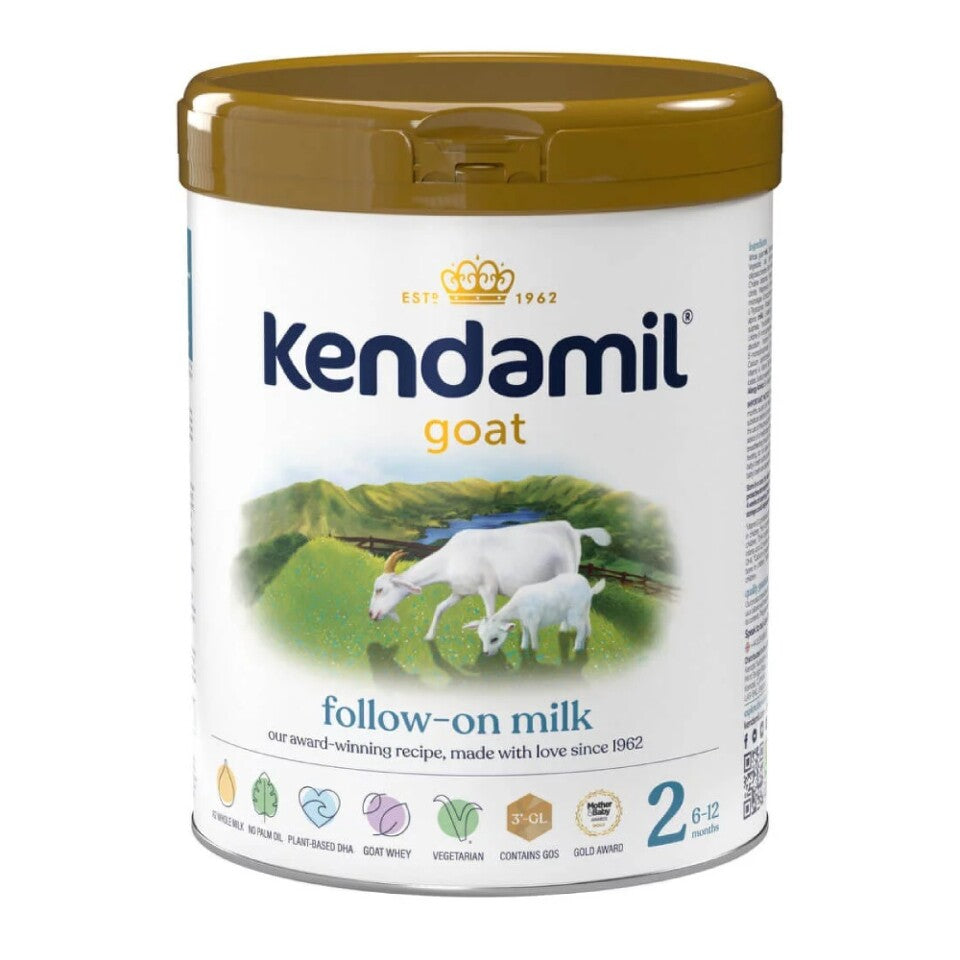Kendamil
Kendamil Goat 2 follow-on milk 800g
Kendamil Goat 2 follow-on milk 800g
受取状況を読み込めませんでした
Follow-up milk infant formula in powder form. Suitable for feeding infants from 6 months to 12 months. The basis of the milk is full-fat A2 goat milk with a predominance of A2 casein, which is more digestible than the more common A1 casein from milk.
- From full-fat goat's milk.
- A2 milk for sensitive tummies.
- Breast milk oligosaccharide (3'GL).
- DHA of vegetable origin 1 .
- Without palm oil, fish oil and soy.
- Pleasant milky taste.
The package contains 800 g.
Dosage and method of use
Remove the protective clip/lock by pulling and immediately dispose of it safely, out of the reach of children. Do not use if the protective clip has been previously damaged. Hold the top of the can with both hands, push both thumbs under the lid and pull upwards to open the lid. Open the lid, the measuring cup is attached inside. Open the foil seal by pulling the "tab" backwards. Carefully and safely remove the foil, then dispose of it.
- Wash your hands, sterilize all tools and the bottle.
- Boil drinking water suitable for infants and let it cool to approx. 40°C.
- Add the appropriate number of level scoops (see dosage chart).
- Close the bottle and shake well to dissolve the powder.
- Remove the cap and replace it with a sterilized pacifier.
- Check the temperature of the milk on the inside of your wrist (recommended temperature is 37°C) and serve immediately.
Use the correct amount of leveled measuring cups as instructed. A child may become sick if more or less scoops are used than prescribed. If you do not use the prepared milk within 2 hours of preparation, we recommend pouring it out and preparing a new one. Do not add products intended for adults, such as shelf-stable cow's milk, to prepared milk. Do not reheat in a microwave oven.
| Volume of water for 1 dose |
Number of scoops per 1 dose |
| 150 ml | 5 |
| 180 ml | 6 |
| 210 ml | 7 |
Ingredients
Full-fat goat's milk (150 g of liquid milk per 100 g of powder), demineralized goat's whey protein in powder (from milk ), vegetable oils (sunflower, coconut, rapeseed), galacto-oligosaccharides (from milk ), lactose (from milk ), calcium citrate, choline bitartrate, potassium chloride, calcium lactate, sodium citrate, magnesium chloride, sodium ascorbate, docosahexaenoic acid (oil from microalgae Schizochytrium sp. ( milk )), L-tyrosine, L-phenylalanine, L-Tryptophan, potassium hydroxide , inositol, arachidonic acid (oil from Mortierella alpina ( milk )), L-Isoleucine, taurine, calcium phosphate, ferrous sulfate, nucleotides (cytidine-5'-monophosphate, sodium uridine-5'-monophosphate, adenosine-5'-monophosphate , inosine-5′-monophosphate sodium, guanosine-5′-monophosphate sodium), L-carnitine, zinc sulfate, vitamin E, niacin, calcium D-pantothenate, copper sulfate, thiamin, riboflavin, vitamin A, vitamin B6, manganese sulfate, folic acid, potassium iodide, sodium selenite, vitamin K, vitamin D3, biotin, vitamin B12. The composition refers to the dried state of the food.
Warning for allergy sufferers: contains milk.
| Nutrition facts | per 100 g | which is 100 ml |
|---|---|---|
| Energy value (kJ/kcal) | 2137/511 | 278/66 |
| Fats (g) | 26,8 | 3,4 |
| - saturated fatty acids (g) | 9,8 | 1,2 |
| - polyunsaturated fatty acids (g) | 6,1 | 0,8 |
| -- sour alpha linolenic (ALA) (mg) | 365 | 47 |
| -- sour docosahexaenoic acid (DHA) (mg) | 120 | 15 |
| -- sour linoleic (LA) (mg) | 3650 | 471 |
| -- sour arachidonic acid (ARA) (mg) | 60 | 7,7 |
| Carbohydrates (g) | 56 | 7,2 |
| - of which sugars (g) | 54 | 7 |
| - of which lactose (g) | 52 | 6,7 |
| Fiber (g) | 1,8 | 0,23 |
| - z toho GOS* (g) | 1,7 | 0,22 |
| - z toho 3'GL** (g) | 0,1 | 0,01 |
| Protein (N x 6.25) (g) | 10,5 | 1,4 |
| Vitamins, minerals | per 100 g | which is 100 ml |
|---|---|---|
| Vitamin A (μg-RE) | 441 | 57 |
| Vitamin D3 (μg) | 11 | 1,4 |
| Vitamin E (mg-α-TE) | 17 | 2,2 |
| Vitamin K (μg) | 32 | 4,1 |
| Vitamin C (mg) | 92 | 11,9 |
| Thiamin (mg) | 0,5 | 0,06 |
| Riboflavin (mg) | 1,2 | 0,15 |
| Niacin (mg) | 5,2 | 0,7 |
| Vitamin B6 (mg) | 0,41 | 0,05 |
| Folate (μg DFE) | 133 | 17 |
| Vitamin B12 (μg) | 0,9 | 0,12 |
| Pantothenic acid (mg) | 3,7 | 0,5 |
| Biotin (μg) | 24 | 3,1 |
| Sodium (mg) | 170 | 22 |
| Potassium (mg) | 660 | 87 |
| Chloride (mg) | 500 | 64 |
| Calcium (mg) | 340 | 44 |
| Fosfor (mg) | 200 | 26 |
| Magnesium (mg) | 48 | 6,2 |
| Iron (mg) | 6,3 | 0,81 |
| Zinc (mg) | 4,3 | 0,55 |
| Copper (mg) | 0,45 | 0,058 |
| Iodine (μg) | 110 | 14 |
| Selenium (µg) | 20 | 2,6 |
| Manganese (μg) | 60 | 7,7 |
| Fluorid (mg) | <0,1 | <0,015 |
| Other | ||
| Taurin (mg) | 45 | 5,8 |
| Cholin (mg) | 125 | 16 |
| Inositol (mg) | 80 | 10 |
| L-Carnitine (mg) | 9 | 1 |
| Nucleotides (mg) | 22 | 0,8 |
100 ml of prepared milk = 12.9 g of powder and 90 ml of water * Galactooligosaccharides ** 3'GL (3'Galactosyllactose) = Oligosaccharide of breast milk, belonging to the HMO group naturally occurring in breast milk
Notice
Food intended for special nutrition.
1 Contains DHA (as required by law for all infant formula. DHA (or docosahexaenoic acid) is a long-chain polyunsaturated fatty acid that is an omega-3 fatty acid that is produced by microalgae and is also found in all animals that Omega 3 is one of the essential fatty acids that the body cannot produce on its own and is therefore dependent on external intake (mostly through diet).
Important note: Breastfeeding is the best way to feed babies. Continued goat's milk is only suitable for infants older than 6 months. Follow-on goat's milk should only form part of a mixed diet and should not be used as a substitute for breast milk during the first 6 months of life. It is not suitable as a sole source of nutrition. The decision to use continued goat's milk, including any exception to the six-month age rule, should only be made on the advice of a doctor, or a person qualified in nutrition, pharmacy or maternal and child care, and depending on the individual needs of your child. When feeding from a bottle, avoid unnecessarily prolonging the contact of the pacifier with the child's teeth, thereby increasing the risk of tooth decay. Be sure to brush your baby's teeth after each feeding before bedtime. Strict adherence to the instructions for preparation and storage is important for the health of infants.
Share


